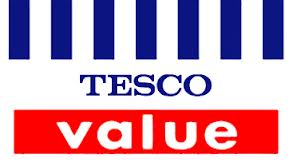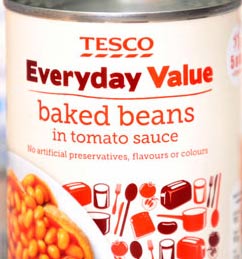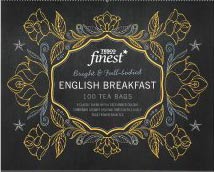Private label brands (or own brand labels) are products sold by a retailer with its own packing, but manufactured by a third party. For example, Tesco sell ordinary branded items, such as Heinz baked beans, but also sell their own ‘Tesco Value’ baked beans. Tesco will license a manufacturer to produce baked beans and then sell the product with it’s own label.
The big advantage of private label brands is that they do not include specific marketing costs; also, if a supermarket has an exclusive deal, average transport costs can be lower and they can benefit from distributional economies of scale. Because of the lower costs, the supermarket can sell the product at a lower price, but also gain a bigger profit margin.
Private label brands have grown in popularity in recent years, suggesting consumers are becoming more sensitive to price and less loyal to their favourite brands. Supermarkets, such as Aldi and Lidl have made significant strides through the promotion of their own private label products. The recent recession was important for changing consumer spending habits – making them more sensitive to price; but also giving consumers the realisation that there is little difference in quality between branded goods and private label. More consumers are aware of the fact that the same companies often make both ‘expensive’ brand names and the less expensive private label; this change in consumer preferences could mean the growth of own brand / private label could continue.
Examples of private label brands

Cheap – cut price. Tesco Value. This was a particular series that offered extremely low prices. There was a time when Tesco used rather unattractive packagingto try and reinforce the image of very low cost / price. It was suggested that the packaging was so dismal to try and dissuade people from buying them, because they made a loss. (I don’t really believe that story, though it is interesting it became common currency.) Also, if you do a google image search for Tesco Value – you can see it is has become a bit of a cult brand, with many ‘humours internet modification, like the Tesco Value Valentines card.)
In recent years, Tesco value dropped its ’super-cheap’ image and made its packing less different to ordinary products. There is an attempt to promote quality rather than the ‘ultra cheap’ – private label.

Tesco finest. Another type of private label brand is to mimic the packaging of better known brands to try and give impression of a similar quality.

Here Tesco is directly challenging the most expensive and best known brands of tea. It shows the confidence of supermarkets that they can try and compete in this way. It would be hard to imagine this a few decades ago.
Issues – Mimicking better known brands.
For private label brands, if they give very similar packing impression as better known brands, they can increase sales. Using very similar packaging is known as ‘copy-cating’ or mimicking. It is illegal to copy brand packaging – so private label brands have to be careful to be sufficiently differentiated and not mislead consumers.
Benefits of private label brands
- Less costs wasted on marketing.
- Supermarket can reduce costs through buying in bulk.
- Lower prices for the consumer.
- Private label brands are often made by same manufacturers as better known brands, therefore quality can be just as good.
- Third party manufacturers do get big contracts for selling direct to supermarkets. This gives guaranteed revenues and sales.
Potential problems of private label brands
- Reduced competition. Supermarkets are in a position to promote their own private label brands and push out other competitors. The growing dominance of private label brands could make it difficult for new smaller firms to enter the market.
- Supermarkets can end up with monopsony power over manufacturers. Because they have market power in selling, they can squeeze the margins of manufacturers to gain bigger profit margins. However, in the UK, the supermarket industry has become more competitive, with new entrants like Aldi, Lidl reducing the market share of the big four supermarkets.
- Less innovation. It is argued that private label brands don’t innovate or create new products – they are essentially copying successful products that have gone before. However, many of the brand label products tend to be products with limited development potential – toilet paper, baked beans and staple groceries.
Related

Tesco’s Value brand is the worst of all the “low price” ranges, reflecting the demise of Tesco itself.
Ingredients are bulked out with non food items e.g. Glucose Syrup (look at the “Value” baked beans for example, truly disgusting). This is reflected throughout the range.
Lidl/Aldi/Iceland knock Tesco into a cocked hat on the lower end of the food spectrum, Whilst Waitrose, and M&S do the same on the upper end of the scale. Tesco has become a victim of it’s own success…it became contemptuous of it’s customers, and is now paying the price.. (pun v.much intended!)
the above brand are good but not that much value,,, came to know first time about this brand,,,
Basically, by buying a private label product, you are purchasing the same product, but for less than what a brand name product is asking for. This is the reason why more and more people are purchasing such products. Then only things that would deter anyone would be if the cost difference was not significant and if the quality was not the same. I really think this is a great move on the part of retail store that benefits not only them, but also their clients.
Can anyone tell me the company that manufacturers Morrisons Private Label Beans?
which places are mostly selling brand and it’s company
I’m looking for Private Label Baked Beans, we are looking to launch a Bake Beans line in 2020. We are Triple D’s BBQ Sauce, and yes we make the best BBQ sauce on either side of the Mississippi.